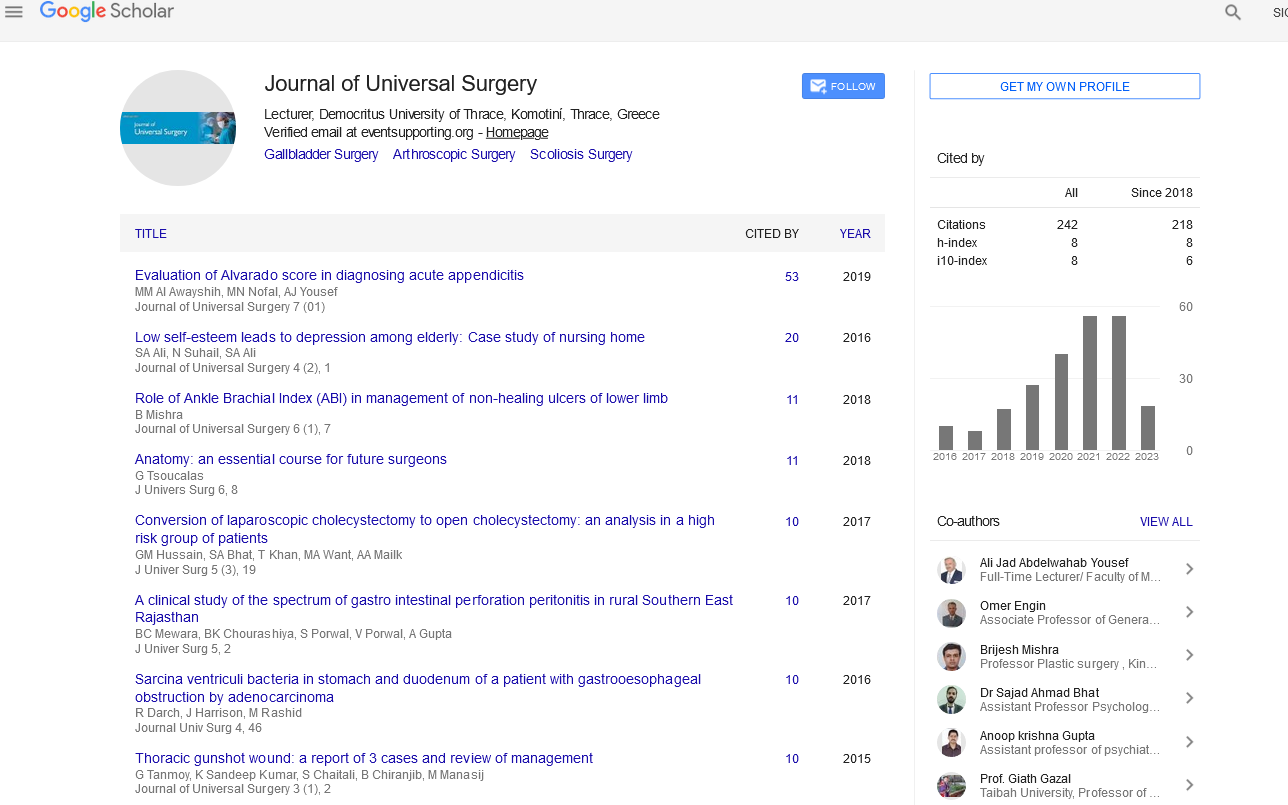Perspective - (2023) Volume 11, Issue 6
Exploring the depths of sinus surgery: A comprehensive guide to nasal health
Derk Baxlein*
Department of ENT, University of Visnja Gora, Ivancna Gorica, Slovenia
*Correspondence:
Derk Baxlein, Department of ENT, University of Visnja Gora, Ivancna Gorica,
Slovenia,
Email:
Received: 06-Nov-2023, Manuscript No. ipjus-23-14350;
Editor assigned: 09-Nov-2023, Pre QC No. ipjus-23-14350;
Reviewed: 23-Nov-2023, QC No. ipjus-23-14350;
Revised: 11-Dec-2023, Manuscript No. ipjus-23-14350;
Published:
19-Dec-2023
Introduction
Hydrocele is a medical condition characterized by the
accumulation of fluid around the testicles, leading to
swelling and discomfort. While some cases may resolve on
their own, others may require medical intervention, often
in the form of hydrocele surgery. In this comprehensive
guide, we will explore the intricacies of hydrocele surgery,
including the procedure itself, potential risks, and the
recovery process.
Description
Sinus surgery, a medical procedure designed to alleviate
chronic sinusitis and other nasal issues, has evolved
significantly over the years. While the mere mention of
surgery may evoke anxiety, understanding the intricacies of
sinus surgery can demystify the process and help individuals
make informed decisions about their nasal health. In this
comprehensive guide, we will delve into the various aspects
of sinus surgery, from the conditions that warrant it to the
types of surgeries available and the recovery process.
Understanding chronic sinusitis
Chronic sinusitis, a condition where the sinuses
become inflamed and swollen for an extended period,
can significantly impact an individual's quality of life.
Common symptoms include nasal congestion, facial pain,
headaches, and difficulty breathing. When sinusitis persists
despite conservative treatments such as medications and
nasal sprays, sinus surgery becomes a viable option.
Conditions that warrant sinus surgery
Sinus surgery is often recommended for individuals who
suffer from recurrent or persistent sinus infections, nasal
polyps, deviated septum, or other structural abnormalities.
These conditions can impede proper drainage of the
sinuses, leading to chronic inflammation and discomfort.
A thorough examination by an Ear, Nose, and Throat
(ENT) specialist is crucial to determine the specific issues
at play and whether surgery is the most appropriate course
of action.
Types of sinus surgery
Several types of sinus surgery exist, each tailored to address
specific issues. The choice of surgery depends on the
underlying cause of the nasal problem. Some common types include.
Endoscopic Sinus Surgery (ESS)
This minimally invasive procedure involves the use of an
endoscope, a thin, flexible tube with a light and camera, to
visualize and remove blockages in the sinuses.
ESS is effective for treating conditions like chronic sinusitis
and nasal polyps without external incisions.
Functional Endoscopic Sinus Surgery (FESS)
FESS is a type of ESS that focuses on improving the
function of the sinuses by removing tissue, bone, or polyps
that may be obstructing normal airflow and drainage.
It is commonly performed on an outpatient basis, allowing
for a quicker recovery compared to traditional open
surgeries.
Balloon sinuplasty
This relatively newer procedure involves inserting a small
balloon into the sinus cavity and inflating it to widen the
nasal passages.
Balloon sinuplasty is less invasive than traditional surgery
and can be an effective option for certain cases of chronic
sinusitis.
Septoplasty
Septoplasty is performed to correct a deviated septum, a
condition where the wall between the nostrils is off-center,
causing breathing difficulties.
During septoplasty, the surgeon may straighten or
reposition the septum to improve airflow.
Image-guided surgery
In cases where the anatomy is complex, image-guided
surgery may be employed. This technology uses real-time
imaging to provide the surgeon with a detailed map of the
sinus anatomy, ensuring precision during the procedure.
Recovery process
The recovery process following sinus surgery varies
depending on the type of procedure performed. In general,
patients can expect some swelling, mild discomfort, and
nasal congestion in the initial days. Pain medication, nasal
irrigation, and follow-up appointments with the surgeon
are typically part of the postoperative care plan.
Postoperative care
Following surgery, patients may be prescribed pain
medications and antibiotics to prevent infection.
Nasal irrigation with saline solution is a crucial component
of postoperative care. It helps keep the nasal passages clean, reduces swelling, and promotes healing.
Return to normal activities
The timeline for returning to normal activities varies but is
generally within a week for most endoscopic procedures.
Strenuous activities and heavy lifting may be restricted
during the initial recovery period to avoid complications.
Long-term follow-up
Regular follow-up appointments with the ENT specialist
are essential to monitor the healing process and address any
concerns that may arise.
Long-term management may include ongoing use of nasal
sprays, allergy management, and lifestyle adjustments to
prevent the recurrence of sinus issues.
Benefits and risks
Sinus surgery can bring about significant improvements in
the quality of life for individuals suffering from chronic
sinusitis and related conditions. However, like any surgical
procedure, it is essential to weigh the benefits against the
potential risks
Benefits: Improved breathing and airflow through the
nasal passages. Reduction or elimination of chronic
sinusitis symptoms.
Enhanced quality of life and overall wellbeing
Infection: While rare, there is a risk of infection
following surgery.
Bleeding: Some patients may experience postoperative
bleeding, which is usually manageable but requires medical
attention if severe.
Changes in smell: In rare cases, patients may experience
alterations in their sense of smell, although this is often
temporary.
Conclusion
Sinus surgery has emerged as a highly effective
and minimally invasive solution for individuals
struggling with chronic sinusitis and related nasal
issues. With advancements in technology and
surgical techniques, the procedures have become
safer and more precise, offering patients a faster
recovery and improved long-term outcomes. If you or a
loved one is considering sinus surgery, consult with a
qualified ENT specialist to explore the most suitable
options based on individual needs and conditions. A
proactive approach to nasal health can pave the way for a
life free from the constraints of chronic sinus issues.





